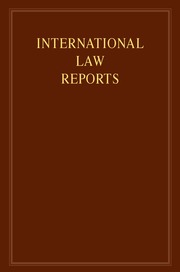Article contents
Aloeboetoe et al. v. Suriname
Published online by Cambridge University Press: 01 January 2021
Abstract
Human rights — Right to life — Right to humane treatment — Right to personal liberty — right to judicial protection — Treaties — American Convention on Human Rights, 1969 — Articles 1, 2, 4, 5, 7 and 25 of the Convention — Massacre in Suriname — Victims members of Saramaca tribe — Republic of Suriname accepting responsibility for violation of human rights
Relationship of international law and municipal law — Obligation to make reparation codified in Article 63(1) of American Convention on Human Rights, 1969 — Applicability of international law to all aspects of reparation — Scope, characteristics and beneficiaries of reparation — Whether such legal obligation subject to modification or suspension by municipal law of respondent State — Relevance of family law of Republic of Suriname — Whether applicable to Saramaca tribe — Determination of victims' successors for reparation purposes — Applicability of general principles of law — Article 38(1) (c) of Statute of International Court of Justice — Relevance of Saramaca custom
Damages — For human rights violations — Obligation to make reparation — Scope of compensation — Actual damages — Moral damages — Right to compensation for damages being transmitted to victims' successors — Determination of successors — Admissibility of claims by dependants — Whether whole Saramaca tribe entitled to moral damages — American Convention on Human Rights, 1969, Article 63(1)
Treaties — Nature of a treaty — Agreement with native American tribe — Whether a treaty — Validity — Jus cogens — Agreement contrary to subsequent norm of jus cogens
- Type
- Case Report
- Information
- Copyright
- © Cambridge University Press 2000
- 5
- Cited by


